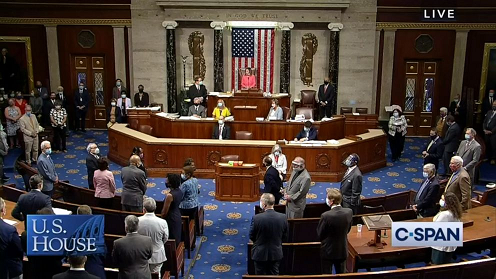
Legislative Shifts and the Future of Concealed Carry: An Opinion Editorial
Recent developments in the U.S. House of Representatives have set the stage for important changes in the way our laws handle concealed carry and firearm due process. In a notable session on March 25, 2025, the House Judiciary Committee advanced two key bills—H.R. 38, the “Constitutional Concealed Carry Reciprocity Act,” and H.R. 2184, the “Firearm Due Process Protection Act.” These actions represent a significant federal intervention aimed at ensuring that gun owners across the nation receive consistent rights and protections, regardless of the peculiar twists and turns of different state laws.
Concealed Carry Expansion and Federally Recognized Reciprocity
The Constitutional Concealed Carry Reciprocity Act, introduced by Representative Richard Hudson (R-NC), seeks to create a federal framework enabling legally certified concealed carriers in one state to carry their firearms in other states that offer similar concealed carry privileges. This initiative is designed to address a patchwork of state-specific laws that currently leave citizens exposed to the confusing bits and tangled issues of cross-state legal uncertainty.
Key Provisions of a Nationwide Concealed Carry Framework
The bill highlights several essential points that many see as a critical step forward for gun rights advocates. Here is a look at some of the central features:
- National Reciprocity: It permits individuals with a state-issued concealed carry permit to legally carry a concealed handgun in any other state that recognizes concealed carry for its residents. This effort is seen as a measure to reduce the nerve-racking unpredictability that comes with differing local standards.
- Preemption of Conflicting State Laws: The bill proposes that most state and local restrictions, which might contradict federal protections, be overridden. This preemption is intended to protect a person’s right regardless of the complicated pieces involved with certain state regulations.
- Legal Safeguards for Carriers: It establishes a private right of action for individuals whose rights are infringed, ensuring that law enforcement cannot arrest them without the typically required probable cause. This component addresses the hidden complexities that law-abiding citizens face when caught in legal tangles.
- Respect for Property Rights: Local governments and private entities retain the authority to set their own rules regarding firearms on their premises. This balancing of federal and local rights is intended to prevent an overwhelming federal mandate in areas where local control is preferred.
Addressing the Tangled Issues of State-by-State Variations
One of the major driving forces behind the push for national reciprocity lies in the fact that a traveler from one state might be legally allowed to carry a concealed weapon at home, yet find themselves in hot water in another state with stricter rules. By creating a unified federal standard, the bill aims to simplify these tricky parts of cross-state travel while reducing the risk for responsible gun owners. This change is expected to have a profound impact on how states interact with federal law and how local law enforcement will adjust to these new federal standards.
Ensuring Due Process in Firearm Transactions: A Closer Look at H.R. 2184
Equally significant is H.R. 2184, the Firearm Due Process Protection Act, sponsored by Representative Tom Emmer (R-MN). This legislation targets one of the more intimidating aspects of the current background check system by focusing on the National Instant Criminal Background Check System (NICS). Its main goal is to guarantee that law-abiding citizens who encounter errors in their records receive an expedited and fair review of their case.
How H.R. 2184 Aims to Correct Data Mistakes and Provide Timely Resolution
Under the present system, individuals mistakenly flagged due to erroneous records often experience nerve-racking delays when attempting to purchase a firearm. H.R. 2184 proposes several measures aimed at closing these problematic gaps:
- Expedited Record Correction: The bill compels NICS to finalize decisions on record correction requests within 60 days. This target timeframe is designed to prevent the overwhelming delays that currently plague the system.
- Statutory Assurance: In granting a clear timeline, the bill provides a statutory safety net for citizens, ensuring that they are not left in legal limbo due to data errors.
- Accountability in the Background Check Process: By making the system more accountable, the bill seeks to build greater confidence in NICS, addressing the minor twists and subtle parts that often lead to user frustration.
The Importance of Fixing Procedural Issues Within NICS
For many supporters, this legislation is a key move in preserving the integrity of the background check system while protecting individual rights. The 60-day review period is not merely a deadline—it is a solution aimed at eliminating the nerve-wracking uncertainty that many firearm purchasers currently face. In effect, H.R. 2184 promises to iron out many of the literal fine points and hidden complexities in the current process.
The Committee Process and Its Impact on Legislative Momentum
The House Judiciary Committee’s recent vote adds momentum to these bills. Their decision to move forward with both H.R. 38 and H.R. 2184 sends a clear signal about the committee’s support for measures designed to bolster Second Amendment protections while addressing the confusing bits and overlapping state regulations. However, as these bills make their way to the full House, they are expected to provoke extensive debate.
Breakdown of Committee Decisions
The decision-making process within the committee has been both transparent and noteworthy for its adherence to party lines. Here is a summary table outlining the committee’s actions:
| Bill | Sponsor | Committee Vote | Main Objective |
|---|---|---|---|
| H.R. 38 | Rep. Richard Hudson (R-NC) | 18-9 (party-line vote) | Establish federal concealed carry reciprocity |
| H.R. 2184 | Rep. Tom Emmer (R-MN) | Voice Vote | Ensure expedited due process in the NICS system |
Critical Analysis of the Committee’s Role
By approving these bills at the committee level, the legislators have taken a significant step in working through the tangled issues present in current firearm laws. Critics argue that such changes might stir tension at the state level, especially in areas where local preferences differ sharply from federal mandates. Conversely, proponents view the bills as a necessary step to streamline legal protections and ensure fairness for all responsible gun owners. In either case, the committee’s decision represents the first step in an uphill journey through the full House and eventually the Senate.
Potential Impacts on State Laws and Local Regulations
One of the more contentious aspects of these legislative proposals is how they might override existing state and local gun control measures. While the bills are designed to create uniformity in gun laws, they also come with potential pitfalls in terms of local autonomy.
Balancing Federal Oversight With Local Governance
Many local governments might find the federal preemption of their policies to be off-putting or even intimidating. The federal framework proposed in H.R. 38 essentially sets a baseline that could sideline the efforts of state and municipal authorities to adopt measures suited to their specific communities. The new law would allow private entities and local governments to retain some measure of control over firearms on their property, yet critics warn that this may not go far enough in preserving local discretion.
Pros and Cons at a Glance
To better understand the potential effects of these bills on state laws, consider the following bulleted list:
-
Pros:
- Uniform concealed carry rights across states.
- Reduction of the nerve-wracking legal uncertainty that affects travelers.
- Enhanced legal protections for individuals facing unwarranted arrest.
- Streamlined process for correcting background check errors.
-
Cons:
- Potential clashes with long-standing local and state firearm regulations.
- Concerns over federal overreach into areas traditionally governed by local law.
- Possible legal challenges questioning the balance between federal and local authority.
Comparative Perspectives: How States Might Respond
A scenario analysis reveals that states with already lax concealed carry laws may readily welcome these changes, viewing them as an alignment of their legal frameworks with the federal standard. On the other hand, states with stricter controls may resist these changes, arguing that local conditions and public safety needs require tailored policies. This tension underscores the broader debate over whether a standardized federal approach can adequately replace state-specific measures that have evolved to meet unique local demands.
Implications for Gun Owners: Balancing Rights and Responsibilities
At the heart of these legislative proposals lies the everyday experience of law-abiding citizens. For many gun owners, the current patchwork of laws presents overwhelming challenges when it comes to traveling or engaging in routine firearm purchases. Both bills offer solutions to these intimidating issues by working through the tangled legal systems that vary unexpectedly from one region to another.
Reducing the Hidden Complexities for Responsible Citizens
For individuals who hold concealed carry permits, the new legislation has the potential to reduce the nerve-wracking uncertainty that comes from encountering conflicting state laws. By establishing federal guidelines, responsible gun owners get a clearer roadmap for their rights and obligations across state lines. The reduction of these tricky parts could also pave the way for fewer legal disputes and more consistent enforcement practices in the field.
Weighing the Benefits Against Potential Risks
While many applaud the bills for offering a more unified approach to firearms legislation, it is important to consider both sides of the argument. The benefits include increased clarity, enhanced protections, and an expedited process for correcting errors in background checks. However, potential risks cannot be overlooked. The one-size-fits-all federal framework might, in some cases, complicate rather than simplify the local oversight that many communities rely on for nuanced public safety measures.
Key Considerations for Gun Owners
For those evaluating the potential changes, it is useful to focus on several key points:
- Uniformity vs. Local Control: How will nationwide standards affect community-specific safety policies?
- Legal Protections versus Overreach: Are the additional rights provided for concealed carry enough to outweigh fears of federal encroachment?
- Resolution Timelines in Background Checks: Will a 60-day deadline for record corrections truly streamline the process?
Future Prospects: The Senate’s Role and the Legislative Path Forward
With both bills now headed to the full House and, if approved, onward to the Senate, the coming months are expected to be full of debate and rigorous discussion. The Senate, with its own traditions and political dynamics, could become a battleground where the practical implications of these bills are scrutinized in minute detail. Lawmakers from both sides of the aisle have signaled that the new legislation will not pass without a long series of votes, amendments, and, potentially, compromises.
Anticipating Senate Debates and Amendments
As these bills reach the Senate, many observers expect that the proposals will face adjustments to account for the subtle parts of state-specific conditions. While some senators may push for more flexible standards that let states retain greater control over local firearm regulations, others will argue that any measure must be rigid enough to provide consistent protections for gun owners nationwide. This environment is, to say the least, tense, as both sides navigate through the tricky parts and fine shades of constitutional interpretation.
Long-Term Implications and the Balance of Power
The eventual outcome of these reforms could set a lasting precedent for the balance between federal oversight and state autonomy. If enacted, the Constitutional Concealed Carry Reciprocity Act could become a model for future laws that aim to harmonize rights across jurisdictions. Meanwhile, the Firearm Due Process Protection Act might serve as a cornerstone for reforming other bureaucratic systems that currently frustrate ordinary citizens with intricate delays and tangled issues.
Conclusion: A Measured Approach to Reform in an Uncertain Landscape
Both the Constitutional Concealed Carry Reciprocity Act and the Firearm Due Process Protection Act reflect an effort to address some of America’s more overwhelming challenges in the domain of firearm legislation. The bills tackle the tricky parts of state-to-state discrepancies and the intimidating delays that can ensnare law-abiding citizens. While their futures in the legislative process remain uncertain, the discourse they have sparked continues to emphasize the need for federal policies that account for both individual rights and the nuance of local governance.
As stakeholders from across the political spectrum weigh the pros and cons, it is clear that finding a balanced solution is crucial. Whether these bills eventually become law or are altered significantly during Senate debates, they underscore a common goal: to create a fairer, more predictable system for gun owners. In a climate loaded with issues and nerve-racking debates, a careful, measured approach seems to be the super important path forward.
Additional Reflections on the Future of Firearm Legislation
Looking further ahead, it is worth noting that the current legislative proposals are part of a broader national conversation about the rights of gun owners, the role of federal oversight, and the sometimes confusing bits of local legal traditions. Gun rights advocates, law enforcement officials, and community leaders will all continue to engage in discussions that aim to probe into the hidden complexities of our legal system. By doing so, they hope to lay down a foundation that minimizes both the intimidating bureaucracy and the inconsistent application of the law.
The evolving nature of these proposals reminds us that, in lawmaking, no solution is ever entirely perfect. Each measure brings with it new challenges, from the nerve-racking responsibility of aligning federal law with local practices to ensuring that every citizen enjoys a process that is both fair and transparent. This balancing act requires that we figure a path through the twists and turns of legislative reform while keeping public safety and individual liberties firmly in view.
Engaging with the Legislative Process
For those who wish to engage more actively with the legislative process, staying informed about debates in Congress is essential. Watch for updates, join community discussions, and examine both sides of the conversation. By taking the wheel in understanding how your rights might be affected, you become a crucial part of the broader dialogue over the role of federal and state law in regulating concealed carry. This engagement, though it may seem intimidating at first, is a necessary part of maintaining a vibrant democratic process.
Looking Ahead: The Role of Advocacy and Public Participation
As these bills progress, advocacy groups on both sides of the issue will undoubtedly intensify their efforts. Proponents of national reciprocity and expedited due process are ready to support measures that correct the current, nerve-wracking delays and legal uncertainties facing gun owners. Conversely, opponents remain vigilant in advocating for community-specific approaches that capture the subtle differences in local circumstances. This duality of perspectives is a testament to the deeply personal nature of firearm legislation in America.
Action Points for Interested Citizens
If you are interested in becoming more involved or simply want to stay updated on future developments, consider using the following steps:
- Subscribe to reliable news outlets that cover legislative developments in detail.
- Attend local government meetings where these national issues may be discussed.
- Engage with grassroots organizations that focus on both gun rights and community safety.
- Review public records and committee reports to get a closer look at the fine points of each proposal.
In conclusion, the legislative journey of H.R. 38 and H.R. 2184 is a vivid portrayal of how federal and state priorities may at times clash—but also how they can potentially come together to craft a more unified legal approach to firearm rights and responsibilities. Even as debates heat up and both bills face their own set of overwhelming challenges, the desire for a system that is both fair and efficient remains a common thread. This ongoing discourse reminds us that, in the realm of law, progress is made by tackling both the obvious and the subtle parts head-on.
While the legislative future remains unpredictable, it is clear that both sides of the debate share a common goal: reducing the tangled issues that come with outdated and inefficient legal frameworks. Whether it involves harmonizing state laws with federal standards or streamlining the corrective processes for background checks, the current proposals mark an important step toward a more predictable and just system. The coming months in Congress will be critical in determining whether these measures can indeed bridge the gap between legal theory and practical implementation.
As our nation moves forward, it is essential to maintain a balanced perspective. In these discussions, it is not merely about asserting rights or imposing restrictions, but about ensuring that every individual can exercise their rights under a framework that is as clear and straightforward as possible. The bills discussed today are emblematic of an ongoing effort to align national values with practical legal solutions—in a system that, while sometimes off-putting in its complexity, ultimately aims to serve the interests of justice.
Final Thoughts
In wrapping up this discussion, one thing stands out: the importance of engaging with the legislative process while remaining open to dialogue across party lines. As lawmakers continue to work through the complicated pieces of these proposals, citizens are encouraged to stay informed, get into discussions, and help steer through the maze of political debate. The road ahead may be filled with nerve-racking debates and unexpected challenges, but it is also paved with the promise of a more consistent approach to protecting constitutional rights.
Ultimately, the evolution of the Constitutional Concealed Carry Reciprocity Act and the Firearm Due Process Protection Act serves as a reminder that meaningful reform often requires navigating both straightforward legal ideas and the subtle twists inherent in any dynamic policy landscape. With careful scrutiny, open dialogue, and active citizen participation, there is hope that these legislative proposals will help build a more transparent and fair system for all.
Originally Post From https://www.usacarry.com/national-reciprocity-bill-advances-in-house-alongside-firearm-due-process-reform/
Read more about this topic at
The Supreme Court Is on the Verge of Expanding Second …
Supreme Court expands gun rights, with nation divided


